On the 30th anniversary of the Oslo Accords, the IDSF HaBithonistim Index explores the Israeli public’s perception in these Accords. This paper offers a review of the insights garnered from the survey in regards to the manner in which the public in Israel perceives the Accord in hindsight. A second article will deal with the public sentiments on future similar accords.
The survey was conducted by the IDSF HaBithonistim research department and with the statistical guidance of Dr. Hagai Elkayam. The sample was conducted among 1,057 respondents from internet-using adult population (18+) in Israel monitored to ensure a proper distribution in terms of age, gender, nationality, religious and political affiliation. For the combined sample (1,057 respondents), the maximum margin of error is ±3.01% with a 95% probability. For the Jewish sample (858 respondents), the maximum margin of error is ±3.35% with a 95% probability; For the Arab sample (199 respondents), the maximum margin of error is ±6.95% with a probability of 95%.
Measures: Security, Economy and Society
The Oslo Accords were related to as interim agreements, and the rationale behind them was to serve as a platform for agreement on part of the issues and to ensure the application thereof, laying the foundations for agreements of further issues.
Thirty years have passed since the signing of that interim agreement, and we set out to determine whether the public in Israel believes that the Accords have achieved their purpose, i.e. advanced the peace process between Israel and the Palestinians.
We started off by asking the participants whether in hindsight, do they think that the Oslo Accord contributed to the security of Israel. Most of the public replied negatively: 64% of the Israelis thought that the Oslo Accords actually harmed Israel’s security, with a majority maintaining that they did so “to a large extent”. An ideological distribution of the Jewish participants shows a large discrepancy between right-wing voters, of which 97% believe that the Accords compromise Israel’s security, and the left-wing voters, of which only 9% thought so. A distribution according to nationality reveals a smaller difference: 73% of the Jewish respondents thought that the Accords compromised Israel’s security, while 28% of The Arab participants thought so as well. This indicates that the portion of Israeli Arabs who think that the Accords compromised Israel’s security was higher than the share of left-wing voters: 28% as compared with 9% respectively.
How do the Israelis perceive the effects of the Oslo Accords on the broader geopolitical environment of the Middle East? It turns out that only 19% of the Israelis thought that the Accords contributed to the political stability and economic growth in the Middle East. A distribution by ideology of the Jewish respondents shows large gaps between the left and right: while only 4% of right-wing voters think the Accords benefited regional stability and economic prosperity, among the left no less than 59% thought so. When we segment the results by nationality, we found that here, too, Israeli Arabs are closer to the right than to the left: only about 26% of Israeli Arabs believe that the Oslo Accords benefited the geopolitical region.
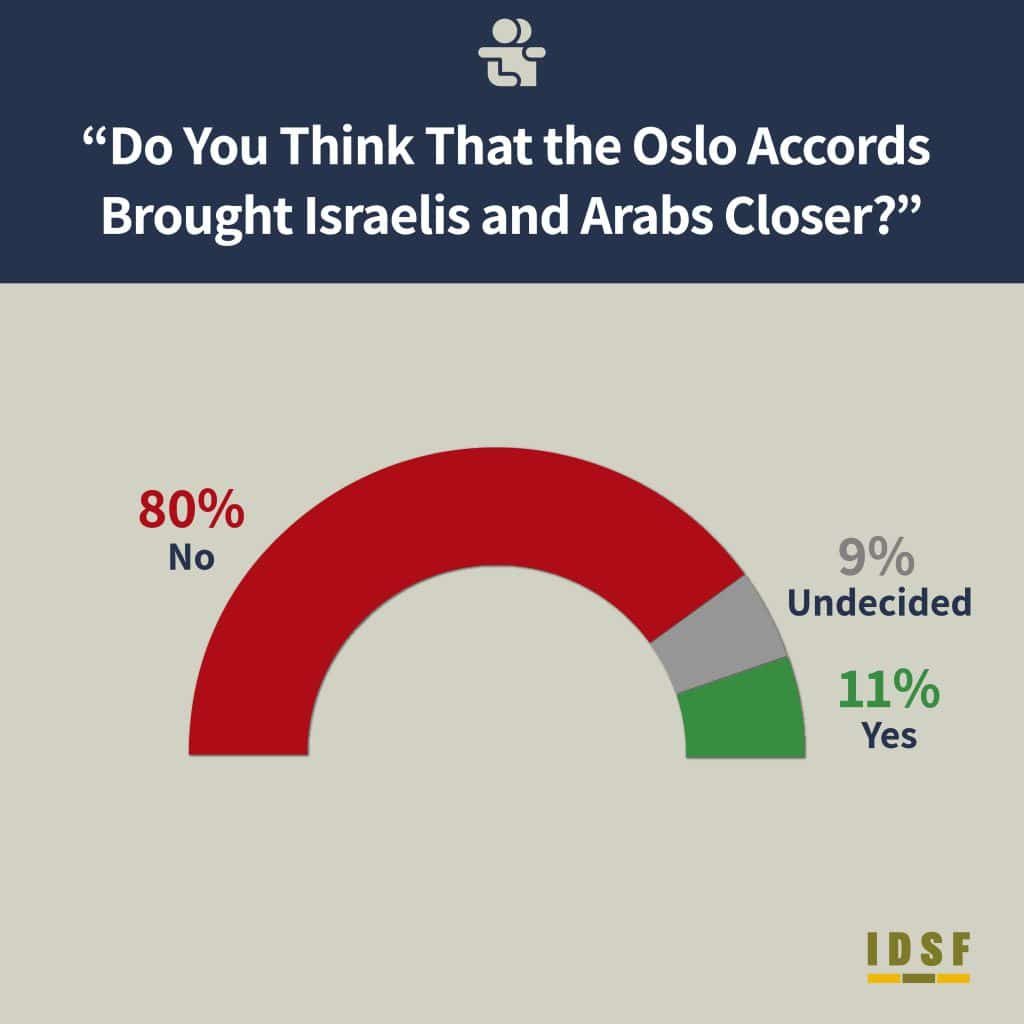
“Do You Think That the Oslo Accords Brought Israelis and Arabs Closer?”
No 80%
Yes 11%
Undecided 9%
Next, we sought to examine the effects of the Oslo Accords on the relations between Israelis and the Palestinians – whether they contributed to bringing them closer. The overwhelming majority of Israelis (79%) believe that the Accords did not bring the Israelis and Palestinians closer. An distribution of the Jewish respondents by political ideology shows that this is indicated more significantly on the political right: 96% of the right-wing voters among the respondents thought that they Accords did nothing to tighten relations between Israelis and Palestinians as oppose to 41% among the left-wing participants. Here too, a comparison between the left-wing participants and Israeli Arabs reveals a large majority among the Arab respondents (70%) who feel that the Accords did nothing the tighten relations between Israelis and Palestinians, which is almost twice as many as the Jewish left-wing voters.
A Palestinian state: security cooperation or security risk?
One claim often heard in regards with the Oslo Accords is that despite their shortcomings, at the very least they facilitate the collaboration between Israel and the Palestinian Authority security apparatus and Israel. Those in support of this stance believe that the cooperation between Israel and the PA, was material in preventing terror attacks in the years since the Accords were signed.
The survey found that only 36% of the Israeli respondents were convinced that the Oslo Accords did actually contribute to better security collaboration between the Israeli security forces and the PA such that prevented terror attacks. A distribution by ideology among the Jewish respondents shows a significant gap between the left- and right-wing participants: Only 13% of the right maintained that the Oslo Accords contributed to better security collaboration, compared to 84% of the left. The discrepancy is also reflected in the distribution of votes within the Arab public: 51% of Israeli Arabs believe that the agreements contributed to better collaboration and thwarted terrorist attacks, while 49% disagreed or were undecided.
Signed by Israel and the PA: Responsibility, Trust and Intention
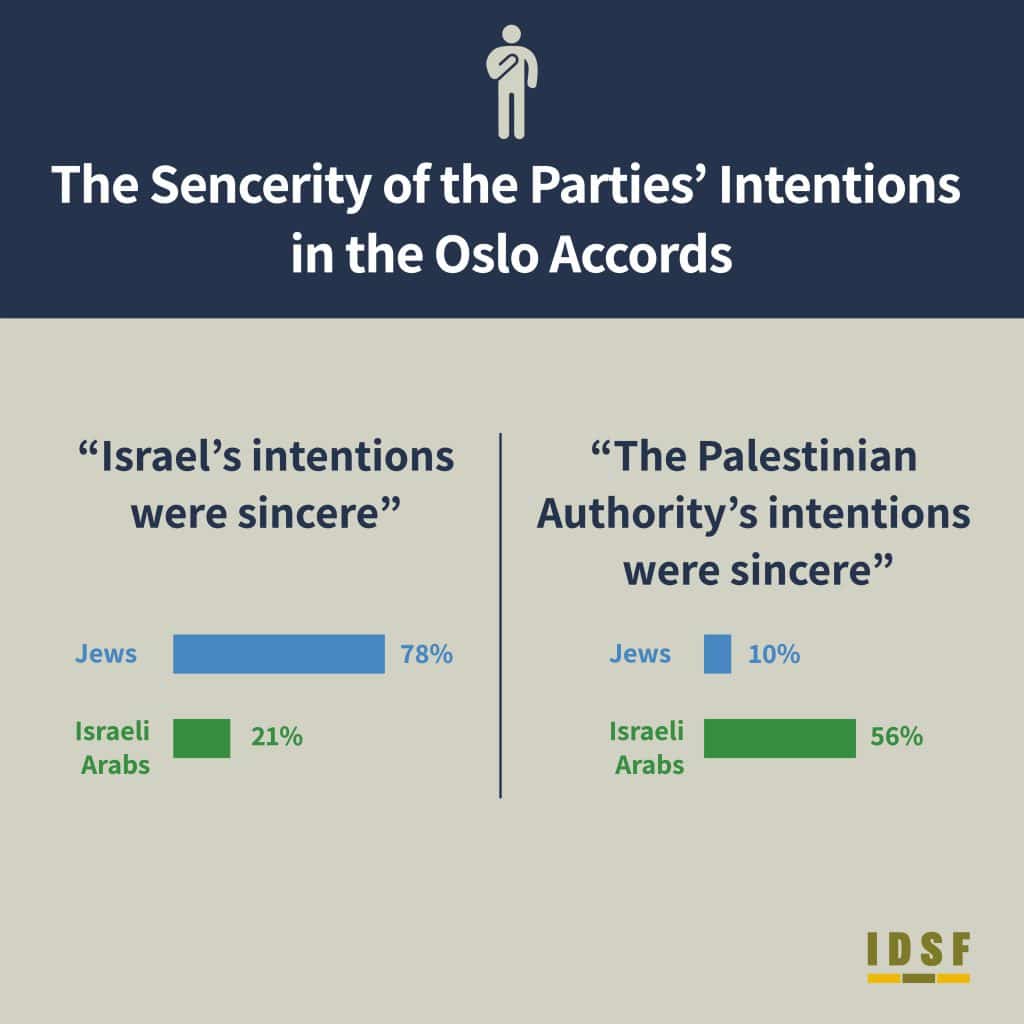
The Sencerity of the Parties’ Intentions in the Oslo Accords
“Israel’s intentions were sincere”
Jews 78%
Israeli Arabs 21%
“The Palestinian Authority’s intentions were sincere”
Jews 10%
Israeli Arabs 56%
In the next part of the survey, we asked the respondents who thought that the Accords diminished the prospects of a diplomatic settlement, who in their opinion bears responsibility for the failure of the Oslo Accords.
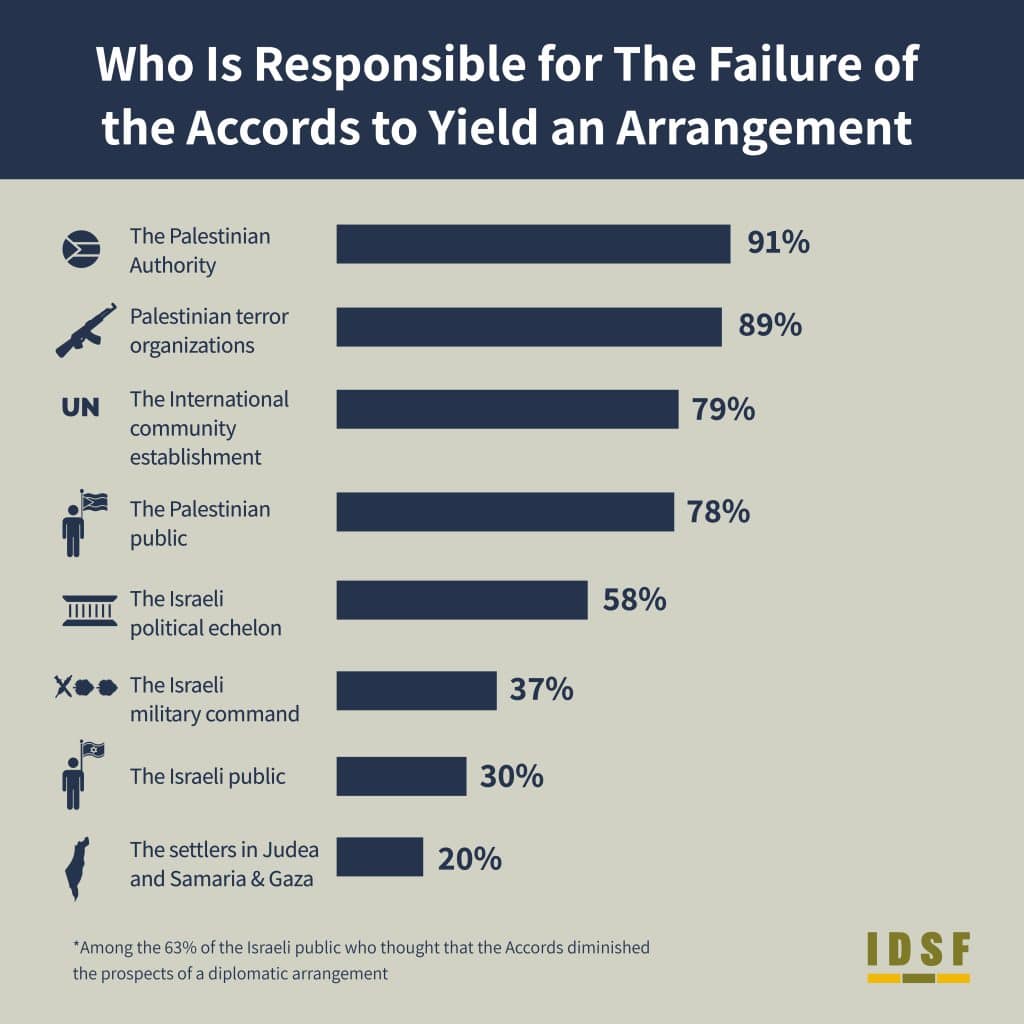
Who Is Responsible for The Failure of the Accords to Yield an Arrangement
The Palestinian Authority 91%
Palestinian terror organizations 89%
The International community establishment 79%
The Palestinian public 78%
The Israeli political echelon 58%
The Israeli military command 37%
The Israeli public 30%
The settlers in Judea and Samaria & Gaza 20%
*Among the 63% of the Israeli public who thought that the Accords diminished the prospects of a diplomatic arrangement
The respondents placed the Palestinian Authority at the top of the list of whom they thought was responsible for the failure of the Accords: 91% believe that the PA is primarily responsible for the fact that the Oslo Accords harmed the prospects of a diplomatic settlement, followed in descending order by the Palestinian terrorist organizations (89%), the international community establishment (79%), the Palestinian public (78%), the Israeli political echelon (58%), the Israeli military command (37%), the Israeli public (30%), and closing the list are the settlers in Judea, Samaria and Gaza, whom only 20% of respondents believe are responsible for the fact that the Oslo Accords did not contribute to a diplomatic arrangement between Israel and the Palestinians
Next, we sought to determine the positions of the Israeli public in regards to how sincere the parties were in their desire to achieve lasting conclusive peace. A significant majority of the Israeli public (66%) thought that the State of Israel was sincerely aiming to gain conclusive and lasting peace with the Palestinians through the Oslo Accords. This position was not only evident among the right-wing participants (85%) but also among the left-wing respondents (63%) and the political center (68%) – all whom believe that Israel came to the table to sing the Accords with the aim of achieving peace. On the other hand, the respondents differed in their perception according to nationality: while 78% of the Jewish respondents have faith in the sincere intentions of Israel to achieve conclusive and lasting peace, only 21% of the Arab respondents thought so.
However, when we posed the same question about the Palestinian Authority, we got opposite results – only 19% of the Israelis thought that the Authority had sincere intentions to achieve conclusive and lasting peace with the State of Israel through the Oslo Accords. A distribution by political ideology did not change the picture – only 37% of the left-wing respondents, 18% of the political center, and 1% of the right-wing respondents attributed sincerity to the Palestinian Authority in signing the Oslo Accords and its desire to achieve conclusive and lasting peace. In contrast, a distribution by nationality shows that only a small majority of Israeli Arabs (56%) believed that the Palestinian Authority sincerely aimed for a conclusive peace agreement when signing the Oslo Accords.
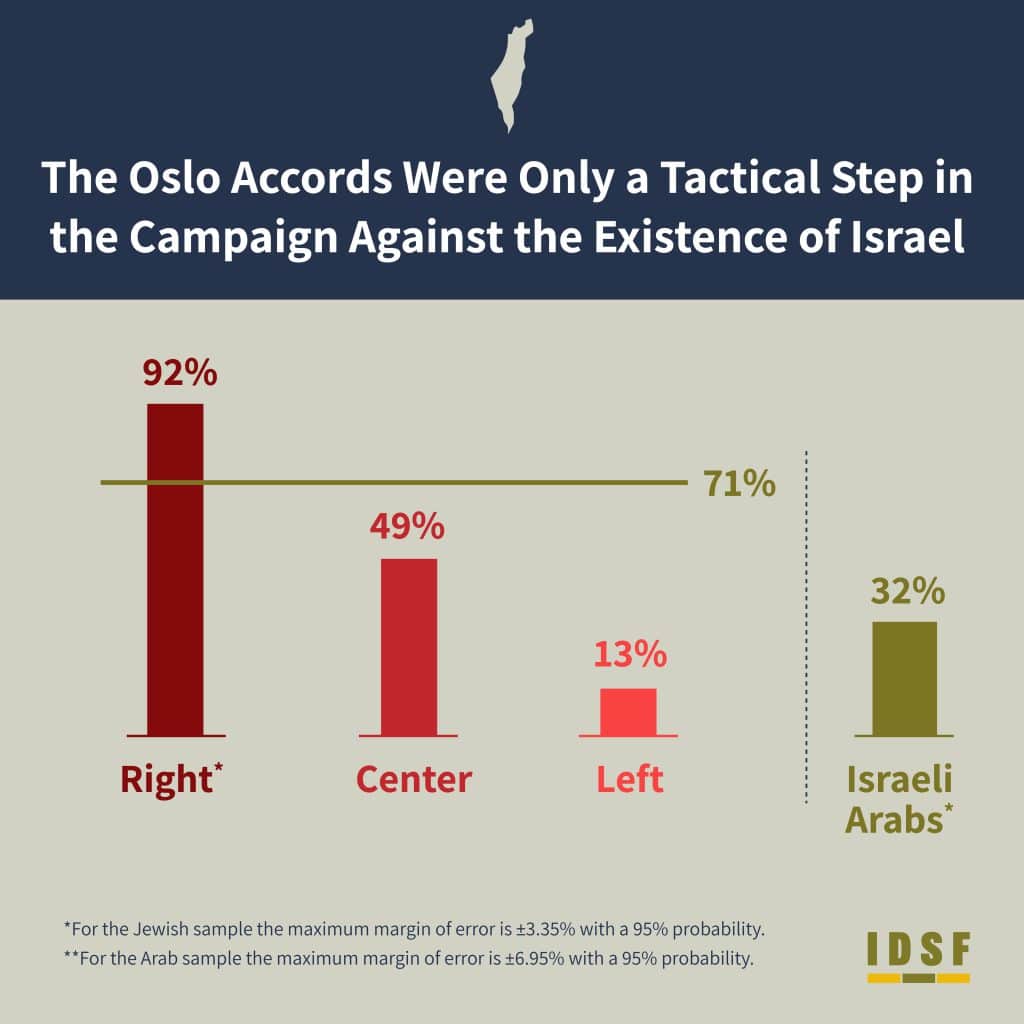
The Oslo Accords Were Only a Tactical Step in the Campaign Against the Existence of Israel
Right 92%
Center 49%
Left 13%
Israeli Arabs 32%
For the Jewish sample the maximum margin of error is ±3.35% with a 95% probability.
For the Arab sample the maximum margin of error is ±6.95% with a 95% probability.
Not only do many in the Israeli public not trust the sincerity of the Palestinian Authority’s proclaimed desire for peace – most believe that from the get go the Accords were simply a ruse to conceal the Authority’s true aim of war against Israel. 71% of the Jews in Israel believe this. The respondents identifying as political right, supported this statement by a vast majority (92%); the center had mixed responses (49%), and among the left-wing participants only 13% supported this statement. Among the Israeli Arab respondents 32% supported this statement – more than 2.5 times of the left-wing Israelis.
Forward Looking: Prospects of a Future Oslo-Like Agreement
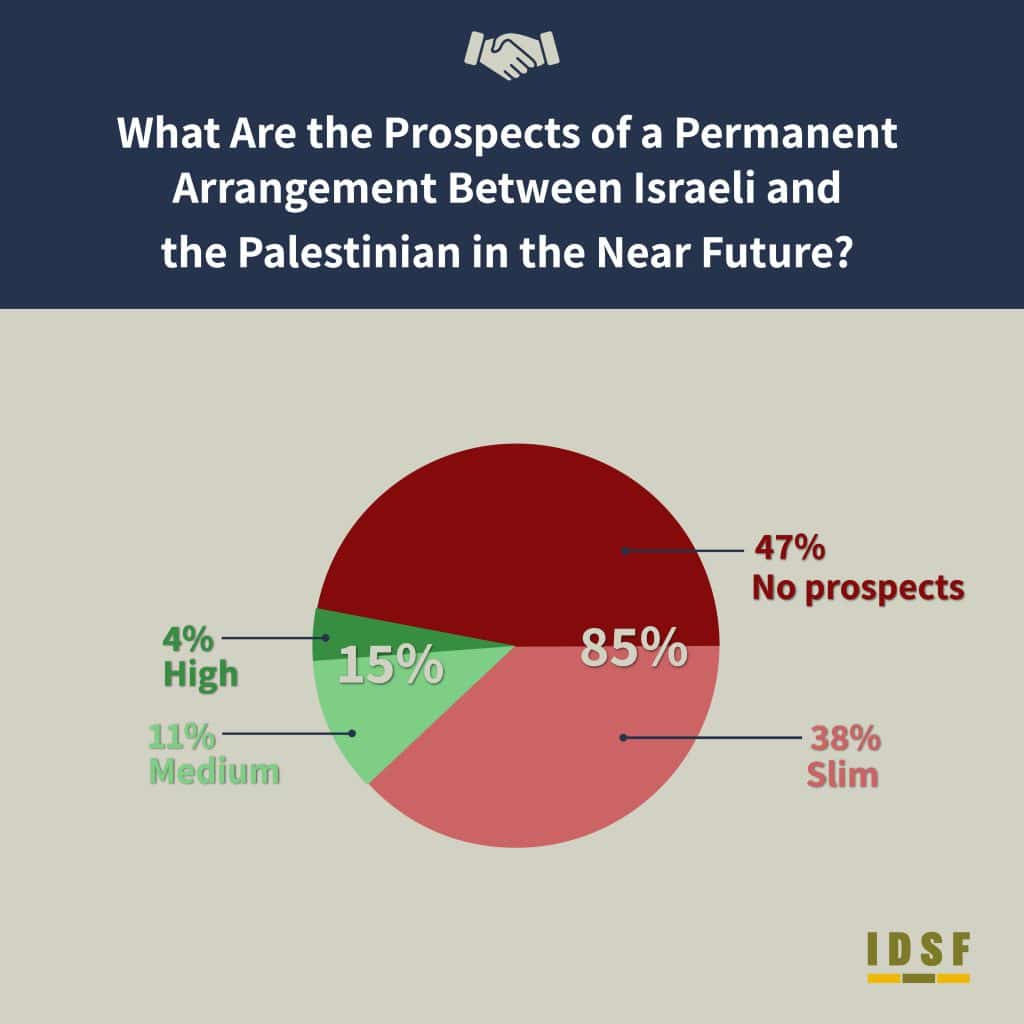
What Are the Prospects of a Permanent Arrangement Between Israeli and the Palestinian in the Near Future?
No prospects 47%
Slim 38%
High 4%
Medium 11%
When we asked the participants how they thought the Oslo Accords contributed to a permanent agreement between Israeli and the Palestinians within the next generation, a majority of 63% of the Israeli respondents maintained that the Accords in fact harmed the prospects of reaching a future permanent diplomatic solution. This majority held also in a distribution by nationality – 52% of the Arab Israelis – as 65% of the Jewish respondents – believe the Oslo Accords hurt the prospects of a diplomatic arrangement between Israel and the Palestinians.
When asked about the general prospects of reaching some form of arrangement between the Palestinians and Israel in the foreseeable future, it turns out that almost half of the Israelis (47%) believed that no form of arrangement with the Palestinians is plausible; 38% saw few prospects of one, 11% thought there was some chance of an arrangement and only 4% saw strong prospects for a peace agreement between Israeli and the Palestinians. In other words, 85% of the Israelis feel that there are no real prospects of attaining a permanent arrangement between Israel and the Palestinians within the next generation.
Interim Summary: There Are Solutions, It Is Important To Keep an Open Mind
Amir Avivi, chairman and founder of the IDSF HaBithonistim Movement, summarizes the findings so far and says that the survey indicates that a clear majority of the Israeli public understands that the Oslo Accords were a failed political move, moreover harming both Israel’s security and the prospects of a future agreement.
Should we relinquish hope for any political settlement? According to Avivi the answer is no. “Israel’s approach has become very fossilized: currently the only acceptable schools of thought are either a two-state solution, which both common sense and reality itself have taught us is not a viable solution, or leaving things as they are, without a political settlement, which by default spells a binational state. But the truth of the matter is that there are many intermediate solutions.”
Avivi concludes: “Our survey shows that only 53% of Israelis believe that there are mid-ground solutions between the extremes of a “two states for two peoples” solution and a binational state. It should be noted that around the world there are at least 60 various models of autonomies and entities. The research department of the IDSF HaBithonistim studied these models in depth and it is our firm belief that is no acceptable reason why the State of Israel cannot also draw from these models and bring about the end of the conflict while uncompromisingly protecting the security interests of the State of Israel.”
